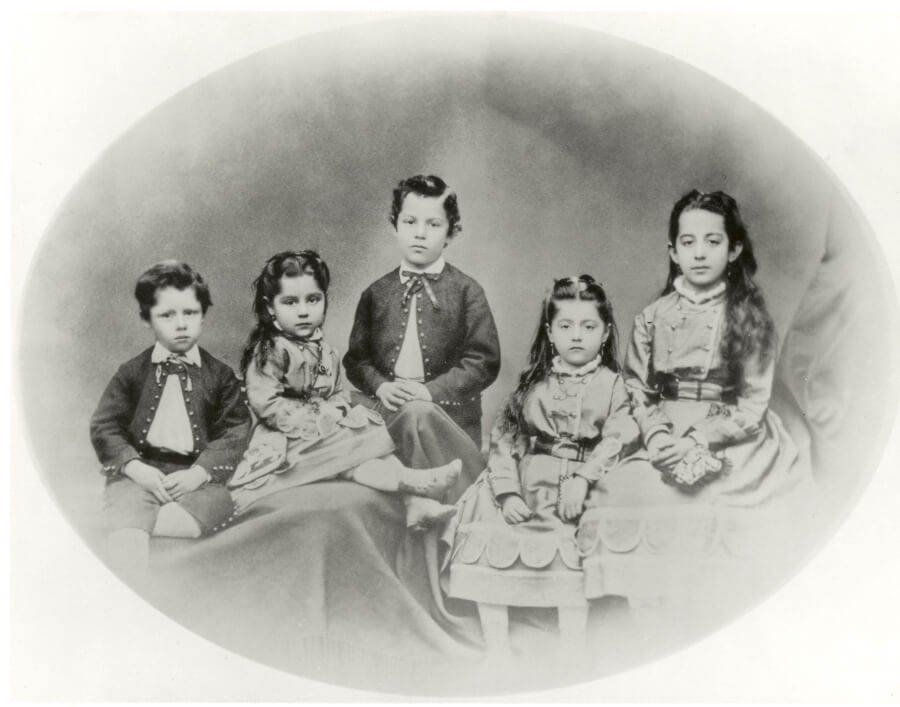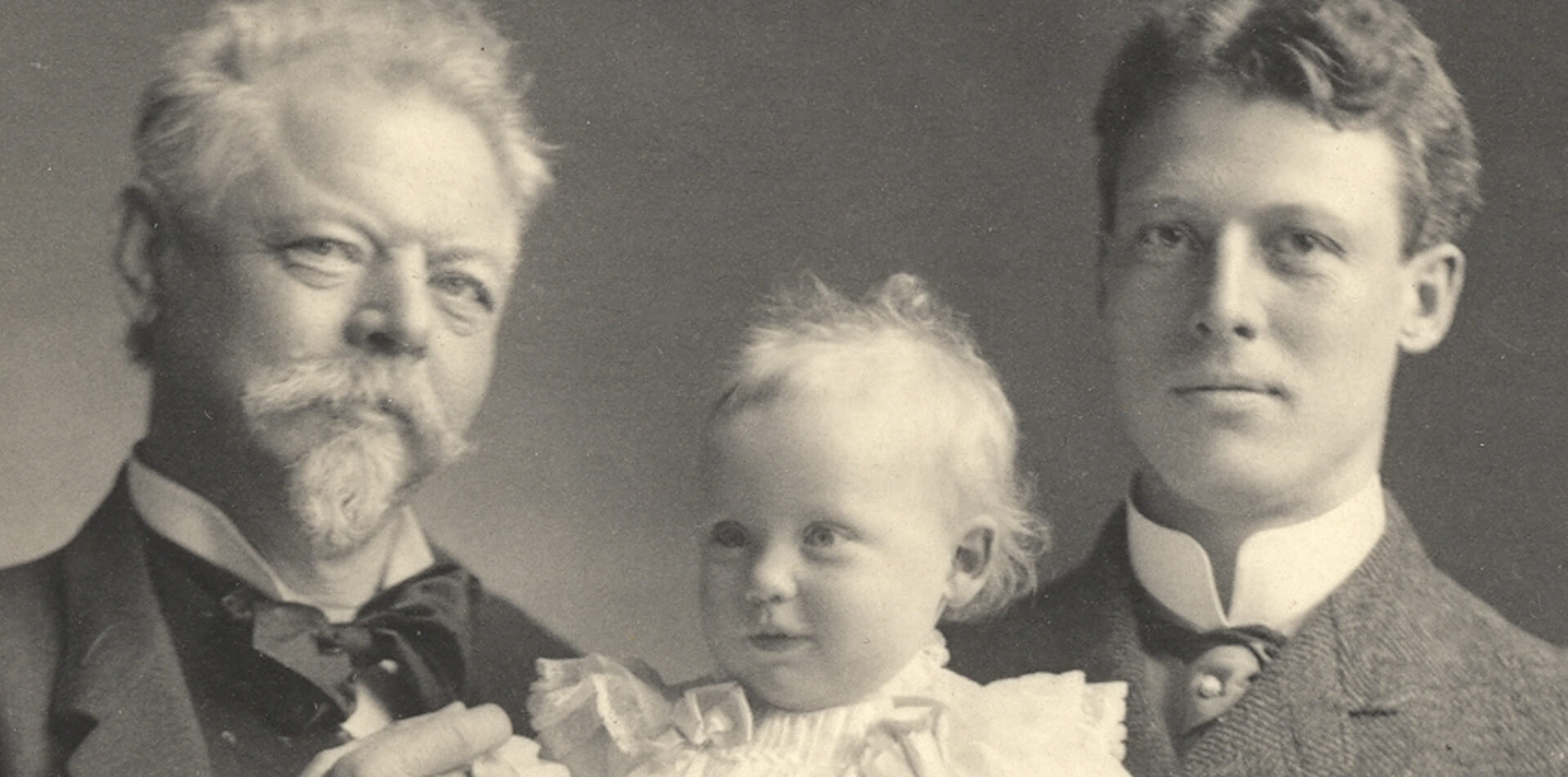By John Eastberg
With Father’s Day approaching, I wanted to reflect on our illustrious Captain Pabst in his role of father. In many ways, he would be viewed as a typical dad through today’s lens, which seems surprising when you consider he was born in 1836. However, his generation of the mid-Victorian father was one that was more in touch with the emotional needs of his family. When one thinks of fathers during the Victorian era, this would seem to run counter to our long-held understanding of what a father should be: the humorless breadwinner, the solemn king of his castle and so on. That was true to be sure in some cases, but during the 19th century, there was a perceptible shift in attitudes for the role of a father and recent scholarship contends that the stern father persona might have just been Victorian bluster all along.Captain Frederick Pabst and Maria Best were a love match in every sense. They would go on to have ten children together, however much to their sadness, five of those children did not live past infancy. Despite his earnestness and devotion to his new wife, he was a Great Lakes steamship captain, which required his being away for the better part of six months a year. Following their marriage in 1862, Maria was with child and gave birth the following year in early 1863. Regrettably, the little baby girl died shortly thereafter. She was soon pregnant again and lost that baby in December of that same year, coinciding with one of the most harrowing couple of days of Captain Pabst’s career—one that culminated in his having to beach his vessel during a winter storm on Lake Michigan. Pabst shortly thereafter relinquished the wheelhouse in exchange for the brewhouse. His decision to stay close to home brought stability to their household and they then had five children in relatively rapid succession, Elizabeth, Gustave, Marie, Fred Jr. and Emma. Three other children would follow and not survive. The loss of children was such a constant in Victorian life and I have often thought of the phrase on the ceiling of Captain Pabst’s study, “A Feeling Heart Suffers Pain” being a reflection of the losses that he and his wife had to endure.
We know a great deal about Captain Pabst’s relationships with his children through letters, photographs and legal documents. When he wrote to his children, his closing was often the affectionate, “Your Loving Papa”. Captain Pabst was a fine businessman, but he was not afraid of wearing his heart on his sleeve with his family and close friends. He was a man with a great sense of humor and thanks to Gary Strothmann on our staff, who is translating Pabst family letters from the 1860s, we are developing an unusually intimate view of Captain Pabst during his first years of fatherhood. He loved to play with his children on the floor of their parlor at their old house at the brewery, to tell his children funny jokes that would make them laugh and after all of this cavorting around, he would also fall asleep in his favorite chair reading the newspaper. Sounds familiar doesn’t it?
As his children grew, he wanted each of them to be well-educated, follow their interests and to marry the one that each child loved. Both Captain and Mrs. Pabst exhibited for their children the ideal of kindness towards their fellow citizens and to practice personal, unostentatious philanthropy in their community. For his two sons, Gustave and Fred Jr., there was no question that they would follow his footsteps into the brewhouse. While ample opportunity was laid before them, he made certain that both boys attended military schools for personal discipline and brewing academies to learn the science and art of brewing. He wanted them to learn the business “from inside the barrel out” or from the bottom up and that they eventually earned, on their own, their executive positions within the company, just as he had.

The brewing company had given the Pabst family so much and he wanted to make sure that the boys could meet the challenge of maintaining and expanding the brewing company even in his eventual absence. As the Captain’s health declined in the 1890s, we now know that he had more or less turned the reins over to his sons much earlier than was ever thought. He was definitely still there to provide insight, counsel and sometimes admonish, but he also wanted to see how they would get along with him taking a back seat to the daily running of the brewery.
The most poignant letter that Captain Pabst ever wrote to his children was one that was enclosed with his will. I will admit that I was emotionally moved the first time I read it and it is so personal in the sense that here is a father trying to convey all the thoughts and wishes for his children for the rest of their lives. It is an important letter and in his own words it cannot be better said:
My Dear Children!
August 30/1899
I place these few lines in the package containing my last will and address them to you, instead of your dear Mother, for the reason, that she and I have several times talked the matter over and she fully understands my wishes herein expressed. You have all been good Children, and a great comfort to me. My happiest thoughts are connected with you in the hope and belief that after I shall be called away, you will, all of you strive to be kind and good to your Mother, and to each other. I have the earnest and cherished desire, that you will, after I am gone, strive to preserve harmony, and good will, and unselfish relations among yourselves. Try to keep the estate I leave you together, so far as you can, and make it productive of not only, of increase and substance, but let it be a cause for mutual confidence and affection. Each of you should yield to the other more or less, if necessary to preserve harmony and union.
Sickness, misfortune, perhaps something worse can come to some one of you, but my dear children, face it bravely, and with hearts full of love for each other. and do just, what you think, I would like to have you do, if I were present to advise and counsel you.
Be generous and unselfish to each other in case of need and above all, be honest and noble, in all your dealings, not only with each other, but with the World.
I want you to always have a good name. It is better than riches, and your greatest happiness will come from your knowledge of doing right.
You must first of all be good to your mother. Do all you can to make her last days her best days, and when she is gone, and you, and you are left without either father or mother, try always to remember my last wishes that you my dear children shall live in harmony and mutual confidence, each doing all in his or her power to keep the estate productive of the best results, for the interest not of any one child, but for all surviving children.
I cannot say more in this letter, it is merely a last word to you all, begging you to remember your Father’s last wish, that you each, and all, do all you can, to promote each others happiness and welfare through life, no matter what changes may come, or how one may be favored, or another frowned upon be the fortunes of the World.
Good bye my dear Children
Your loving Father.
The original copy of this letter surfaced over twenty years ago and we realized what an important letter this is, not only that it was written by Captain Pabst, but rather that it very well could be one of the very best letters written by a father to his children. In his study at the Pabst Mansion, we offer complimentary copies of this letter if anyone cares to take a copy of it. Invariably, once someone starts to read it, they pick up a copy to take it with them and remark, “I think I’m going to include this with my will!” In the last twenty years, we have printed tens of thousands of copies of this letter, proving that a father’s wish for the happiness and success of their children is timeless.

